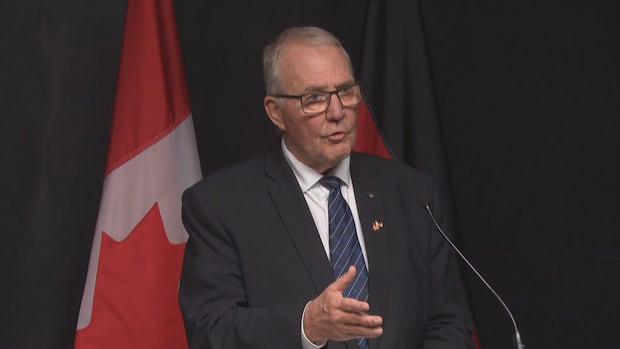A call by almost two dozen U.S. senators for increased Canadian military spending needs a serious response from Canada, one of those senators says.
In an interview that aired Sunday on Rosemary Barton Live, Kevin Cramer, a Republican U.S. senator for North Dakota, said it’s time for Canada to make clear a plan to spend two per cent of GDP on the armed forces by the end of the decade.
“We’d sure like to have our closest neighbour and closest friend step up a little bit…. Frankly, there are very few countries in NATO that are doing less in terms of percentage of their GDP than Canada, and we’d like to get that number higher,” Cramer told CBC chief political correspondent Rosemary Barton.
Twenty-three U.S. senators wrote to Prime Minister Justin Trudeau on Thursday expressing their concern about Canadian military spending.
“Canada will fail to meet its obligations to the Alliance, to the detriment of all NATO Allies and the free world, without immediate and meaningful action to increase defence spending,” the senators wrote.
“This is a very unified message. I want [Trudeau] to not only take the letter seriously, but respond to it seriously,” Cramer said.
“We, the United States, the free world, the North Atlantic Alliance, needs everybody to step up a little more. But Canada’s got a long ways to go to get to two per cent.”
In response to questions about the letter, Trudeau told reporters on Friday: “We recognize there’s more to do and we will be there to do it.”
He said military spending had risen significantly during the Liberals’ time in office and that “we’re not done yet.”
Defence Minister Bill Blair says Canada is still short of meeting its NATO commitment to spend two per cent of GDP on defence but is making strides towards that goal, and new investments in military infrastructure inevitably will push spending past that target.
In its most recent defence policy publication, the government estimated new commitments will raise spending to 1.76 per cent of GDP by 2029-30. The new policy, unveiled in April, includes an additional $8.1 billion in new defence spending over the next five years and commits to an additional $73 billion in defence spending over the next two decades.
“I’m sure that I’d be able to assure those concerned senators that Canada will be a ready and capable ally to NATO,” Defence Minister Bill Blair said Thursday.
The senators’ letter is the most recent escalation in a series of instances of public pressure from allies on Canada.
U.S. Ambassador David Cohen has in the past noted the importance of the two per cent target but also said that the United States takes a “broader view” of military commitments that goes beyond spending.
In a separate interview on Rosemary Barton Live, former U.S. ambassador to NATO Kurt Volker said lacklustre military commitments from allies was part of the reason the U.S. had difficulty passing legislation to authorize major aid packages to countries like Ukraine, Israel and Taiwan.
“One of the reasons it is so difficult is persistent perceptions in the U.S. that other allies are not doing their share, and so Canada is actually contributing to that difficulty of maintaining U.S. support by having such a low level of spending. So it is something for people to take seriously,” he said.
The federal Conservatives have accused the government of neglecting the military and weakening Canada’s international image.
“Trudeau is once again kicking the can down the road by committing most of the defence spending in today’s announcement until after the next election,” Conservative defence critic James Bezan said in April.




